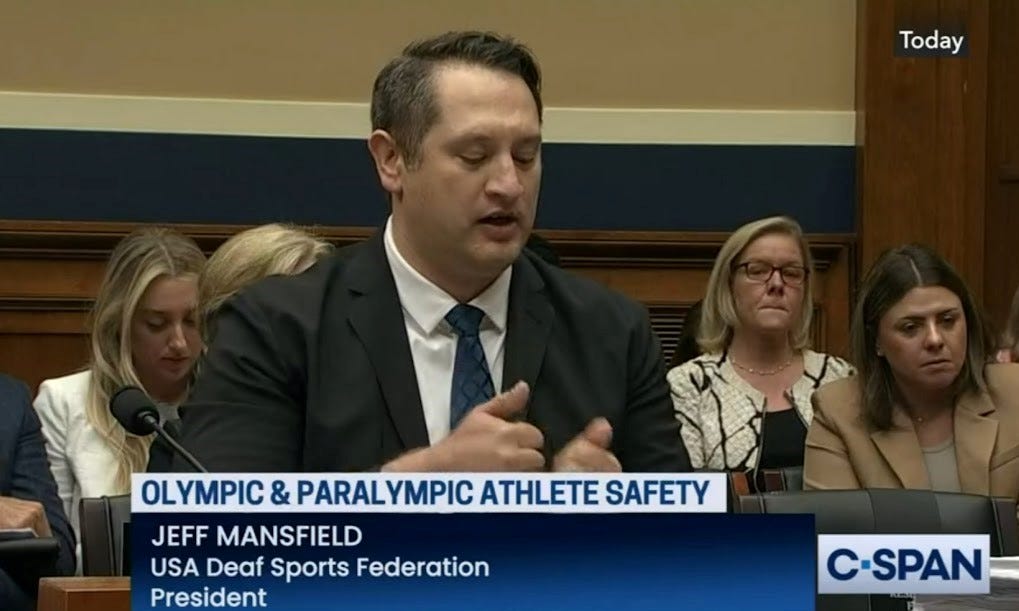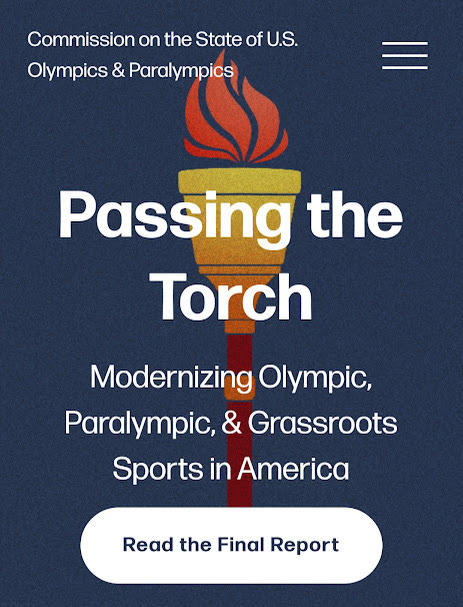"Deaf" Excerpts From The CSUSOP Final Report
After dissecting the 277-page Final Report of the Commission on the State of U.S. Olympics and Paralympics (CSUSOP), I selected the following “readable” excerpts relating to “Deaflympics” for your reading (or studying.)
Page 17
Congress should also study further the challenges faced by deaf and hard-of-hearing athletes and proposals to integrate deaf sports into the U.S. Olympic and Paralympic movement; in the meantime, USOPC should work with the U.S.A. Deaf Sports Federation to remove impediments to its full use of Deaflympic trademarks and access to sponsorships.
Page 41
Footnote #105: Local Affiliate Organization; USOPC’s bylaws make certain sports organizations eligible for affiliate status as long as they qualify under one of five categories: 1) community-based multisport; 2) education-based multisport; 3) Armed Forces; 4) recognized sport; or 5) take some part in administering or organizing major sporting events in the United States. Examples of affiliate organizations include U.S.A. Football (which is not internationally governed for the purposes of Olympic competition), the NCAA, and community organizations such as the Boys and Girls Clubs of America, Special Olympics, and the U.S.A. Deaf Sports Federation.
Pages 50 and 51
Because U.S. Paralympics does not recognize deafness as an official disability category for the purposes of eligibility, deaf and hard-of-hearing athletes have built their own parallel system of sports participation. Organized around the world by the International Committee of Sports for the Deaf (ICSD) and in the United States by the U.S.A. Deaf Sports Federation (the ICSD’s equivalent of a national organizing committee), their quadrennial summer and winter Deaflympic Games have been operating continuously since 1924. While the IOC recognized the ICSD and accepted the Deaflympics as part of the broader global Olympic movement in 1955, deaf and hard-of-hearing athletes and their sports were omitted when Congress organized the U.S. Olympic movement under the Ted Stevens Olympic and Amateur Sports Act in 1978 and the 1998 amendment integrating U.S. Paralympics. In part, that decision resulted from a concern by both Paralympic and Deaflympic officials that both would lose funding and representation if U.S. Deaflympics were to be brought inside the U.S. Olympic and Paralympic movement—as well as a hesitancy by U.S. Paralympic officials to cover the cost of sign-language interpreters at events.
For deaf and hard-of-hearing athletes, the barriers to participation in Olympic sports are markedly different from those of athletes with other physical disabilities within the Paralympics. While para sports involve adaptations to either the athlete (e.g., through a prosthetic or wheelchair) or to the sport itself (e.g., through use of a sight-guide or a modified playing field or rules), deaf sports require only adapted methods of communication. A sprinter who cannot hear a gunshot must have another way to know exactly when a race begins. A device with flashing lights takes the place of the starting gun. Flags replace whistles on a soccer field. In such ways, deaf and hard-of-hearing players have traditionally partaken in Olympic sports, not Paralympic ones—albeit with adapted communication where permitted.
One of the challenges stemming from the status of U.S. Deaflympics not being addressed by the Ted Stevens Olympic and Amateur Sports Act is the U.S.A. Deaf Sports Federation’s inhibited ability to seek sponsorship funding or raise revenues using the “Deaflympics” trademark. Though the IOC has granted this trademark to the Deaflympics on an international basis, this is not the case in the United States. As a result, the development of deaf sports at all levels across the country has been hampered through a lack of sufficient funding. Another challenge centers on concerns raised about the ability of SafeSport to address the unique needs of deaf and hard-of-hearing youth, who are at a 25% greater risk from abuse generally than the rest of the population. (Footnote 163) While clubs and leagues operated under the umbrella of the U.S.A. Deaf Sports Federation, which holds affiliate status with USOPC, are subject to SafeSport’s jurisdiction, SafeSport has not implemented any specialized programs focused on the safety of deaf and hard-of-hearing athletes.
An additional challenge for deaf and hard-of-hearing athletes is equitable access to non-para and nondeaf sports. In 2020, the parents of a seven-year-old deaf athlete who was denied accommodation by his local NGB-affiliated local soccer club in Colorado sued in federal court on the grounds of a violation of the Americans with Disabilities Act (ADA). The suit contended that the club had stopped providing auxiliary-hearing aids and interpretive services, requiring the parents to pay for them out of pocket, creating a financial burden that led to their son leaving the soccer program. Under a settlement reached through the U.S. Attorney’s office, the local soccer club agreed to pay compensatory damages and accommodate deaf and hard-of-hearing athletes. (Footnote 164) Currently, NGBs are not required to comply with the ADA, in large part because of the nature of non-para sports and because PSOs are supposed to fill the gap by creating corresponding opportunities for athletes with disabilities to participate equally in sports. However, with Congress having left deaf sports outside the statutory framework of the U.S. Olympic and Paralympic system, ambiguities concerning accessibility requirements must be clarified through the judicial process.
Footnote 163: Rochester Institute of Technology, “Abuse rates higher among deaf and hard-of-hearing children compared with hearing youths,” February 15, 2011.
Footnote 164: U.S. Attorney’s Office, District of Colorado, “U.S. Attorney’s Office Gets Relief Under ADA for 10-Year-Old Deaf Soccer Player,” April 10, 2020.
Page 67
Additionally, we heard from the USADSF—the multi-sport USOPC-affiliate organization that operates adapted competitions for deaf and hard-ofhearing athletes—that it does not receive any notification from SafeSport when its participants have cases closed administratively. Instead, only the NGB or PSO for that sport is notified, even though the participants may have reported through USADSF, which also falls under SafeSport’s jurisdiction and has personnel and processes in place to support the unique needs of deaf and hard-of-hearing athletes that NGBs and PSOs may not. The impact of SafeSport’s administrative-closure policies and their heavy use has been far-reaching and contributed to a lack of trust in the system by athletes, coaches, and governing-body officials alike.
Page 139
Recommendation #8: Access and equality for Paralympians and those participating in para sports at all levels must be improved.
Congress should further study the issue of integrating deaf and hard-of-hearing athletes and deaf sports into the U.S. Olympic and Paralympic movement, while USOPC should work with the U.S.A. Deaf Sports Federation to resolve impediments to the latter making full use of Deaflympic trademarks and obtaining sponsorships.
Page 141
During the course of our study, the Commission heard from many in the deaf and hard-of-hearing community about the unique challenges they face accessing movement sports, as well as the history of the Deaflympics and its relationship to the U.S. Olympic and Paralympic movement. Since the enactment of the Ted Stevens Olympic and Amateur Sports Act, deaf and hard-of-hearing athletes have been left outside the current system, at various times seeking inclusion or celebrating their unique standing. We believe the issue of integrating deaf and hard-of-hearing athletes into the U.S. Olympic and Paralympic movement merits further study by Congress, with a goal of ensuring that all athletes who want to participate in the movement can always do so with the accessibility accommodations they need—and to clarify current ambiguities around communication channels between SafeSport and the USADSF when athletes in the Deaflympic movement report abuse or misconduct. In the meantime, the Commission recommends that USOPC and USADSF work together, in coordination with the U.S. Patent and Trademark Office, to ensure that USADSF can make use in the United States of trademarked words and phrases that the IOC has granted to Deaflympics internationally and that USADSF can enter into sponsorships without hindrance from USOPC.

Pages from 198 to 200
Read USA Sports Federation Jeffrey Mansfield’s five-minute testimony and his answers to Commissioners at the CSUSOP hearing in Washington DC on September 6, 2023, by clicking The CSUSOP Final Report on pages 198 to 200.
THEREFORE, the Commission recommends that Congress study what the USADSF, Deaflympians, deaf athletes, and hard-of-hearing athletes need!
Inspired by The Sports Examiners Editor Rich Perelman’s quote, “But that’s in the future. The Commission has come and gone. Now the politics start,” I created the below one!




